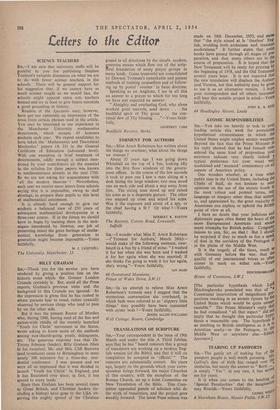&Hers to the Editor
SCIENCE TEACHERS
SIR,—I am sure that university staffs will be grateful to you for publishing Stephen Toulmin's valuable discussion on what we are to do with fewer science teachers in the schools. There will be general support for his suggestion that, if we cannot have as much science taught as we would like, the schools might appoint extra arts teachers instead and try at least to give future scientists a good grounding in history.
Readers of the Spectator may, however, have got too optimistic an impression of the crisis from certain phrases used in the article. You may be interested in our experience in the Manchester University mathematics department, which accepts 45 honours students each year. We expect candidates to have taken the Mathematics and Theoretical Mechanics' papers (A 23) in the General Certificate of Education (advanced level). With one exception (a brief treatment of determinants, oddly enough a subject men- tioned by your contributor) all the material In the syllabus for these papers was known to mathematicians already in the year 1700. So we are not asking for acquaintance with
'all the modern theories' I Nevertheless, each year we receive more letters from schools saying that it is impossible, owing to staff shortage, to prepare their pupils to this level of mathematical attainment.
It is already hard enough to give our students a balanced view of 250 years of subsequent mathematical development in a three-year course. If in the future we should have to begin by training them in the tech- niques introduced by Newton, our job of preserving intact the great heritage of mathe- matical knowledge from generation to generation might become impossible.—Yours faithfully,


















































 Previous page
Previous page